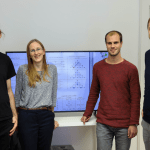Quantum News Briefs November 25: The Biden administration has racked up a host of cybersecurity accomplishments; SandboxAQ named to Fast Company’s second annual list of the Next Big Things in Tech; Quantum Computing moves from out of theoretical into startups in Boston + More

Quantum News Briefs November 25: The Biden administration has racked up a host of cybersecurity accomplishments; SandboxAQ named to Fast Company’s second annual list of the Next Big Things in Tech; Quantum Computing moves from out of theoretical into startups in Boston + More.
The Biden administration has racked up a host of cybersecurity accomplishments

Cynthia Brumfield has authored an editorial about the Biden Administration’s engaged extensive set of initiatives on cybersecurity. Quantum News Briefs summarizes below with particular attention to quantum.
In mid-October, the White House issued a fact sheet about the Biden-Harris administration’s “relentless focus” on improving the nation’s cybersecurity to tout its impressive sprint.
The document outlined the administration’s actions since January 2020, when President Biden assumed the presidency. In its fact sheet, the administration said it was building a comprehensive approach to “lock our digital doors” and take aggressive action to strengthen and safeguard U.S. cybersecurity.
Among the domestic accomplishments cited are those related to quantum computing:
Developing quantum-resistant encryption and leadership in quantum computing while mitigating risks to cryptographic systems through four new encryption algorithms that will become part of the National Institute of Standards and Technology’s (NIST) post-quantum cryptographic standard and increased R&D investment in quantum technology.
In the face of all these and other actions, such as mandatory incident and ransomware payment reporting requirements, some experts say it might be time for the administration to pause on further executive orders and policy pronouncements to allow the federal apparatus to catch up. Bob Kolasky, senior vice-president for critical infrastructure at Exiger and a former DHS official, tells CSO: “If I were the administration, I would stop coming up with more good ideas and I would take the good ideas that they’ve already come up with and make sure that they’re effectively implemented.”
“I think there’s a danger of trying to do too much, so I don’t think 2023 needs to be more policymaking. It needs to be more attention to details and getting feedback from industry and operational folks to ensure that the implemented requirements are well designed.” Click here to read original CSO editorial in-entierety.
*****
SandboxAQ named to Fast Company’s second annual list of the Next Big Things in Tech
 SandboxAQ, an enterprise SaaS company delivering the combined impact of AI and Quantum technology (AQ), announced November 17 that was been named to Fast Company’s second annual Next Big Things in Tech list, honoring technology breakthroughs that promise to shape the future of industries—from agriculture and environment to productivity and artificial intelligence. Quantum News Briefs summarizes the announcement below.
SandboxAQ, an enterprise SaaS company delivering the combined impact of AI and Quantum technology (AQ), announced November 17 that was been named to Fast Company’s second annual Next Big Things in Tech list, honoring technology breakthroughs that promise to shape the future of industries—from agriculture and environment to productivity and artificial intelligence. Quantum News Briefs summarizes the announcement below.
This year, 83 technologies developed by established companies, startups, or research teams are highlighted for their cutting-edge advancements and potential to impact consumers, businesses, and society overall.
Fast Company evaluated the SandboxAQ security suite of applications that helps enterprises and government organizations assess their security posture, and manage cryptography to protect sensitive data from emerging quantum threats such as SNDL attacks via implementing quantum-resistant cryptographic algorithms and protocols. SandboxAQ not only protects organizations, but it also empowers them to reevaluate and strengthen their entire cyber architecture, building more adaptable and scalable IT architectures, efficiently replacing vulnerable algorithms, protocols, or cryptographic providers, and infusing cryptographic agility into their enterprise. Click here to read the PRWeb announcement.
*****
Quantum Computing moves from out of theoretical into startups in Boston
In September, Northeastern University announced it will build a $10 million lab at its Burlington campus to explore applications for quantum technology, and to train students to work with it. And companies based in other countries are setting up outposts here to hire quantum-savvy techies.
Several Boston-local venture capital firms are getting comfortable with placing bets on the quantum computing sector. Glasswing’s Rudina Seseri says that her firm is “seeing momentum pick up.”
Much of the revenue available to these companies today comes from researchers in academic and corporate labs trying to understand the potential of quantum computers. Sam Liss, an executive director in Harvard’s Office of Technology Development, thinks that “the large commercial opportunities for quantum are still a long way off.” The OTD helps attract corporate funding to Harvard research labs, and also helps to license technologies created in those labs to the private sector. “Technologies have a way of getting oversold and overhyped,” Liss says. “We all recognize that this is going to take some time.”
Large companies like Amazon, Google, and IBM are trying to move the field forward, and startups are beginning to demonstrate their new approaches. In the startup realm, Liss says, we’re seeing enough new companies being formed and attracting funding “to support a thesis that this will be a big thing.” Click here to read original Boston Globe article in-entirety.
Helmholtz-Zentrum Berlin team develops algorithm for fictitious error-free quantum computer and runs on conventional servers simulating a quantum computer
 Quantum computers promise significantly shorter computing times for complex problems. But there are still only a few quantum computers worldwide with a limited number of so-called qubits. However, quantum computer algorithms can already run on conventional servers that simulate a quantum computer. Quantum News Briefs summarizes a recent announcement.
Quantum computers promise significantly shorter computing times for complex problems. But there are still only a few quantum computers worldwide with a limited number of so-called qubits. However, quantum computer algorithms can already run on conventional servers that simulate a quantum computer. Quantum News Briefs summarizes a recent announcement.
A team at Helmholtz-Zentrum Berlin (HZB) developed an algorithm for a fictitious, completely error-free quantum computer and ran it on a classical server simulating a quantum computer of ten Qbits. The scientists limited their study to smaller molecules in order to be able to perform the calculations without a real quantum computer and to compare them with conventional calculations.
The team succeeded in calculating the electron orbitals and their dynamic development on the example of a small molecule after a laser pulse excitation. In principle, the method is also suitable for investigating larger molecules that cannot be calculated using conventional methods. The calculations allow the electron densities and the changes after excitation to be determined with high spatial and temporal resolution.
“These quantum computer algorithms were originally developed in a completely different context. We used them here for the first time to calculate electron densities of molecules, in particular also their dynamic evolution after excitation by a light pulse,” said Annika Bande, who heads a group on theoretical chemistry at HZB. Together with Fabian Langkabel, who is doing his doctorate with Bande, she has now shown in a study how well this works.
Indeed, the quantum algorithms produced the expected results. In contrast to conventional calculations, however, the quantum algorithms are also suitable for calculating significantly larger molecules with future quantum computers: “This has to do with the calculation times. They increase with the number of atoms that make up the molecule,” said Langkabel. While the computing time multiplies with each additional atom for conventional methods, this is not the case for quantum algorithms, which makes them much faster.
Click here to read original article from Helmholtz-Zentrum Berlin
*****



















